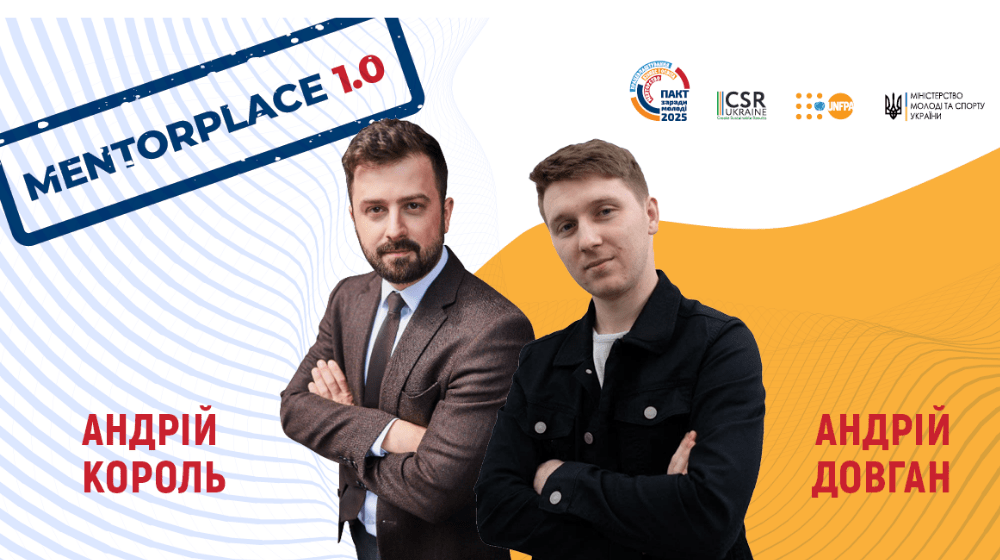Read about the experiences of participating in a mentorship programme for young people, why it is sometimes useful to give up employment opportunities and how young people teach freedom and openness to the world.
In the summer of 2021, the Centre for CSR Development together with the United Nations Population Fund (UNFPA) and the Ministry of Youth and Sports of Ukraine launched Mentorplace, a pilot programme under the Pact for Youth 2025.
The project brought together successful professionals in communications, sales, marketing, HR, project management, accounting, event management, psychology and HoReCa (hotel, restaurant, catering) with young people who sought to get inspired with success stories, get advice and motivation.
All participants were able to talk to mentors about finding a job and building a career in a particular field, get tips on books, courses, internship programmes and even present their own projects and discuss them in detail with the mentor.
We spoke with mentors and mentees of the pilot programme about their needs, how mentoring influenced their professional growth and unleashed their potential, what were the biggest challenges for participants and why this format of corporate volunteering is important.
Mentee Andrii Dovhan / Mentor Andrii Korol
Andrii Dovhan, Sales Coach
“Rather than giving advice, seasoned experts make you think. That’s the greatest value I’ve received.”
I saw an ad for a mentorship programme and was very interested because there was an opportunity to get mentoring support from an expert who has extensive experience in sales. I had specific long-term inquiries. I realised that I needed to think about them myself, but the tips of a mentor who has already solved similar issues would give a lot of charge, inspiration and better understanding.
I enjoyed working with the mentor. We had 2 meetings online. At the first one, we met, identified my expectations, needs and requests. The second meeting was the one where I was able to raise many issues. The mentor asked deep questions that could not be answered immediately; you had to think and even write down your findings.
Thanks to the questions asked by the mentor, I rejected one of the development directions in my field because I realised that it was not for me. I had the opportunity to get a job as a quality manager, but I realised that I was not ready for the routine of the position. In addition, I identified the set of skills I have and how to use them most profitably for the existing directions of my development.
I believe that mentoring is a cool opportunity and should be used because rather than giving advice, seasoned experts usually make you think. That’s the greatest value I’ve received.
Andrii Korol, Commercial Director of Kaparol Ukraine
“Mentoring is important because it’s about history.”
In fact, I’ve been thinking about mentoring for a long time. I have been in management and sales for over 10 years, so I feel I have something to share with young people; I can help them develop and motivate them to grow. As a student at the university, I taught English, so it is very important for me to share knowledge and experience, to see feedback and interest. This was my first mentoring experience and I hope that it’s not the last.
I had 2 mentees who made me realise that now young people are in a huge ocean of information and opportunities, but it is difficult to find what you need in this ocean.
The young people we will be hiring are people who are not afraid of anything and are ready to try, but at the same time, they take a long time to make decisions and cannot decide on the direction in which to move. Therefore, it is critical for them to ask themselves questions that would help them understand what to do, where to move, and what exactly to try if they decide to do so. These are the questions I asked my mentees.
Mentoring was a challenge for me: it was difficult to understand how to build the very structure of the discussion to allow the mentee to express themselves and reflect. It was also important to find a common language, because the mentees have a different way of thinking.
Every professional who works in business and is involved in corporate volunteering does a lot of work with young people in terms of developing their competencies. As for freedom and openness to the world, it is the mentees who can teach us much more than we are able to teach them.
I believe that mentoring is important because it’s about history. They say you can’t build a future without knowing the past, but I don’t think you can build a trouble-free, least risky and progressive career without mentoring. Without the experience of predecessors, which can motivate the mentees to adjust decisions and behaviour, every young person may face the same obstacles and risks as other professionals, because all processes are cyclical.
I would advise you to try mentoring at least once because the mentor shares their experience, helps young people to answer the questions they asked themselves before. And, most importantly, the mentor helps to ask the right questions, because they often reveal the main points of value and direction of each person.
Read also about Maryana and Tatiana’s experiences of participating in the pilot mentorship programme.


